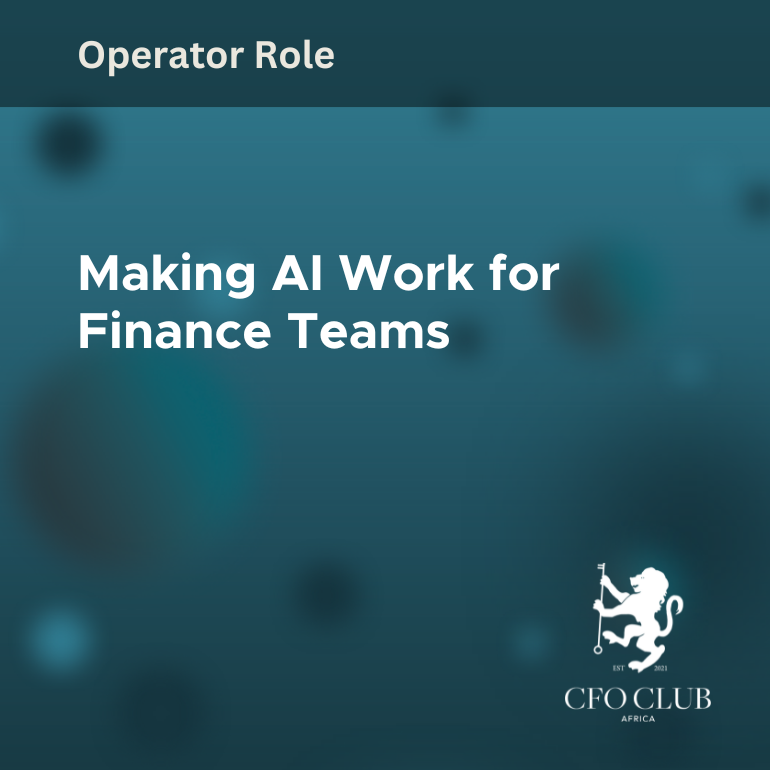Making AI Work for Finance Teams
AI is no longer a futuristic concept or a boardroom buzzword. It has become a practical tool in finance departments where accuracy, control, and speed matter most. For CFOs, the real opportunity lies in using AI to make daily operations simpler, cleaner, and more reliable. The goal is not to replace people but to remove friction so your finance team can focus on better decision-making.
Getting the Numbers Right, the First Time
Every CFO knows that a single error can ripple through financial statements, causing sleepless nights and unnecessary audit findings. AI tools now help prevent those mistakes before they happen. Systems that reconcile transactions automatically can flag mismatches, spot duplicates, and detect outliers in seconds.
Instead of spending hours cross-checking spreadsheets, your team can review exceptions and focus on real risks. AI improves consistency across reports and eliminates human error caused by fatigue or time pressure. The result is simple: cleaner numbers, faster closes, and fewer post-year-end surprises.
Closing Faster Without Compromising Control
Month-end doesn’t need to be a scramble. AI-driven tools continuously pull, clean, and categorise financial data while transactions are still happening. By the time your reporting window opens, most of the groundwork is already done.
This shift turns closing from a reactive process into a daily rhythm. You can track financial health in real time and act before issues become material. For multi-entity businesses, automation also creates consistency across subsidiaries—no more waiting for manual consolidations or version conflicts between spreadsheets.
AI doesn’t take away control; it gives you better control by removing unnecessary manual effort. You can review, approve, and sign off with confidence, knowing that every adjustment has been traced and logged.
Making Controls Smarter
Internal controls are the backbone of financial integrity. Traditional reviews often happen after the fact, but AI allows continuous monitoring. Systems can now flag unusual transactions, identify vendors with odd billing patterns, or detect sudden changes in spending behaviour.
This early warning capability protects your business from fraud and waste. Instead of relying on quarterly checks, you get live alerts that help your team act before a small issue turns into a financial loss.
Because every alert comes with a full data trail, audit readiness improves automatically. It also builds trust—your board, auditors, and regulators see a control environment that runs 24/7, not one that wakes up once a quarter.
Reducing Compliance Stress
Keeping up with changing tax, reporting, and disclosure rules is one of the biggest headaches for finance teams. AI helps by scanning regulations, identifying updates, and matching them against your company’s obligations.
Some tools even prepare draft disclosures, highlighting areas where your numbers or narrative may be inconsistent. That means fewer late nights before filing deadlines and more time for quality review instead of chasing information.
By reducing manual review, AI also cuts compliance costs and lowers the risk of missing new requirements. For finance teams already stretched thin, that’s a tangible return.
Turning Data into Decisions
Finance teams sit on a mountain of data. The problem has always been time—by the time numbers are gathered, cleaned, and summarised, the business has already moved on. AI changes that.
Machine learning models can scan thousands of data points and highlight trends you might not see: late-paying customers, rising input costs, or shifts in product margins.
Scenario tools make it possible to test the financial impact of exchange rate movements or fuel price changes in minutes. That agility means you can brief your CEO or board with current insights, not outdated data.
When finance leads the data conversation, it also earns a stronger voice in strategy discussions.
Keeping the Human Factor at the Centre
While AI handles routine work, judgment and ethics remain human territory. Algorithms can spot patterns, but they can’t understand the context of a decision or the values that guide it. CFOs still need to ask: Is this result fair, transparent, and in the best interest of the organisation?
The best finance teams treat AI as a support system, not a replacement. Automation handles volume; people handle meaning. Oversight, scepticism, and ethical awareness will always be the final checks that protect integrity.
Building Readiness in Your Team
Implementing AI successfully starts with data discipline. Clean, structured, and standardised information is the foundation. Once your data is reliable, automation can follow.
Training is just as critical. Team members must learn how to question AI results, interpret trends, and explain them clearly to management. Skills such as data literacy, communication, and risk understanding become as important as accounting knowledge.
Start small—automate reconciliations, journal approvals, or reporting templates—then expand into forecasting and analysis once your team gains confidence.
Why It Matters for CFOs
AI is not a side project; it’s part of the finance function’s natural evolution. It helps deliver the precision, accountability, and transparency expected of modern finance teams.
By adopting these tools early, CFOs set the tone for efficiency and credibility. The finance function becomes known not only for accuracy but also for agility and insight. That reputation builds influence across the organisation—and that influence, more than any technology, is what defines great financial leadership.





